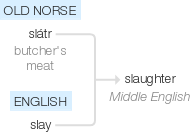Slaughter
Middle English (as a noun): from Old Norse slátr ‘butcher's meat’; related to slay1. The verb dates from the mid 16th century.
wiktionary
From Middle English slaughter, from Old Norse *slahtr, later sláttr, from Proto-Germanic *slahtrą, from Proto-Germanic *slahaną. Equivalent to slay + -ter (as in laughter). Eventually derived from Proto-Indo-European *slak-(“to hit, strike, throw”). Related with Dutch slachten, German schlachten (both “to slaughter”).
etymonline
slaughter (n.)
c. 1300, "the killing of a person, murder; the killing of large numbers of persons in battle;" mid-14c., "the killing of a cattle or sheep for food;" from a Scandinavian source akin to Old Norse slatr "a butchering, butcher meat," slatra "to slaughter," slattr "a mowing," related to Old Norse sla "to strike," from Proto-Germanic *slagan- (see slay (v.)).
The form was perhaps influenced by Middle English slaught "killing, manslaughter, carnage; butchery of animals," the native cognate, from Old English sliht, sleht, slieht "stroke, slaughter, murder, death; animals for slaughter;" as in sliehtswyn "pig for killing."
slaughter (v.)
1530s, "butcher an animal for market," from slaughter (n.). Meaning "slay wantonly, ruthlessly, or in great numbers" is from 1580s. Related: Slaughtered; slaughtering.
